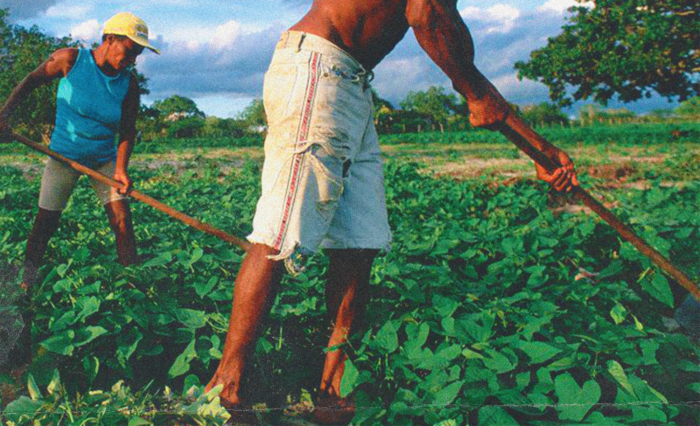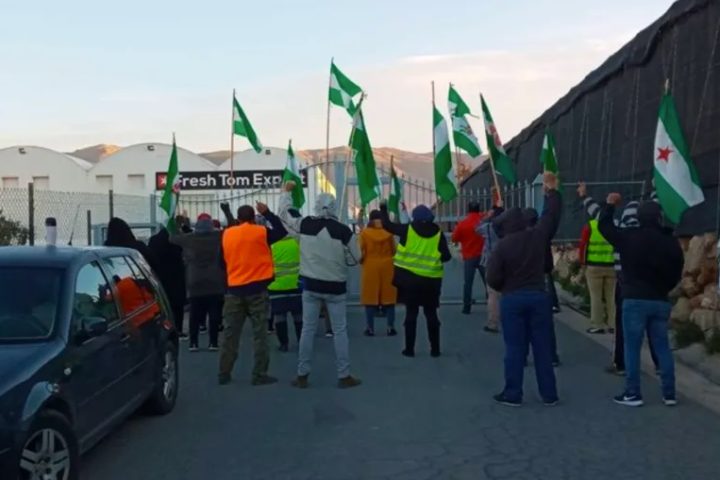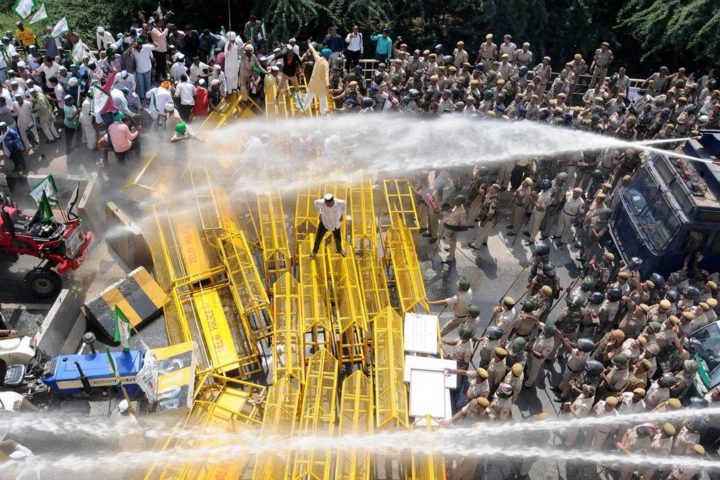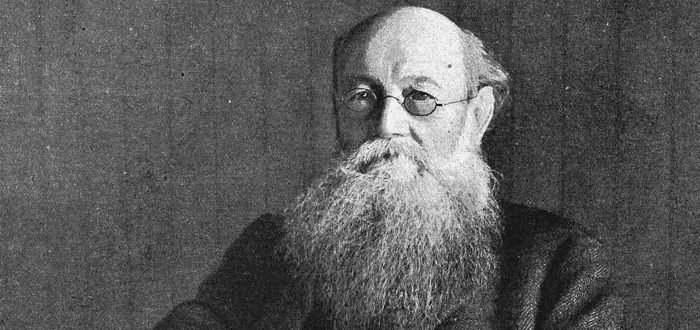From: https://blackrosefed.org/agroecology-organized-anarchism/
In response to the industrial, capitalist model of food production that has decimated rural lifeways and our mother earth, social movements around the world have identified agroecology as their alternative proposal for rural development. Grounded in peasant and indigenous knowledges, struggles for food sovereignty and agrarian reform, agroecology is understood by social movements as “a tool for the social, economic, cultural, political and ecological transformation of communities and territories.”
This interview that Black Rose conducted in the Summer of 2020 with a militant from The Anarchist Federation of Rio de Janeiro’s (FARJ) Peasant Struggle Front, explores their work with some of Brazil’s social movements struggling for agroecology and food sovereignty. Coming from a context with highly developed peasant social movements, FARJ shares important insights for anarchist militants to learn from.
BRRN: Can you first give an overview of the kind of social work that the militants of FARJ’s Peasant Struggle Front are involved in? What are the movements and organizations the FARJ’s militants participate in/collaborate with? Who are the protagonists of these movements & organizations?
FARJ: Initially the Front was called “Anarchism and Nature”. Some of the members were students from the Federal Rural University of Rio de Janeiro. Starting from a university agroecology group, the GAE (Ecological Agriculture Group), they sought to do social work in Agrarian Reform settlements in the state of Rio de Janeiro and with families of small farmers. And the space that articulated these activities was the Rio de Janeiro Agroecology Articulation.
Starting from this process and frequent contact in the settlements, the MST (The Landless Rural Workers Movement) got to know the working style of our militants, until one of them was invited to join the movement, contributing mainly to the processes of organizing cooperative work in the Baixada Fluminense region. One of the results of this work was the contribution to the organization of a sales and distribution cooperative for an MST settlement in the metropolitan region of the state of Rio, around 2008. As time went on, more militants joined the Front; some from rural areas, from the MST, or students in the field of agronomy.
Around 2012 the MPA (Small Farmers Movement) arrived in Rio, and we have militants from our front contributing also to the movement and its development in the state. We also have a comrade who works in the Pastoral Land Commission (CPT).
Our work in rural movements and spaces is related to themes such as rural education, political training [formação1], communication, production, sales and distribution, and human rights. We always seek to maintain a link with the bases of the movements, even those militants who live in the state capital or in the city. We seek to contribute to the accumulated knowledge of FARJ and the historical experiences of organized anarchism in peasant struggles, with our concept of social work and militant style, pursuing the development of popular power. We stimulate the political participation and the protagonism of the grassroots in the processes of movements’ daily struggle. We also seek to encourage alliances and joint actions between rural and urban movements where we also operate or which we support, such as solidarity actions, actions for exchanging experiences between the movements’ bases, visits, and campaigns, among others that enable contacts between the bases.
Today we have militants in the MST, MPA and CPT. The protagonists are landless workers, small farmers, and quilombola [maroon descendant] communities. Many in the settlements, for example, come from the sugar cane industry, from work analogous to slavery, from slums, or were precarious workers. A good part of the movements’ bases are black folks, youth, and women.
BRRN: Can you talk about how you personally came to be involved in peasant movements and movements for food sovereignty & agroecology? Why do you think it is important for anarchists to be engaged in these struggles? What is the importance of these struggles in this moment of the global Covid-19 pandemic in particular?
FARJ: My militancy was in the Community Front, in the Base Organization Movement (MOB), which currently works in the Center of Social Culture and in the Morro dos Macacos community. Since 2013 I supported the MST with graphic design for the Cícero Guedes Agrarian Reform State Fair, a 3-day annual fair in the center of the city of Rio de Janeiro with the produce from the state, the southeastern region, and partners in the city and other movements. Around 2014, MPA and MST started a biweekly farmers market on the Praia Vermelha campus of the Federal University of Rio de Janeiro, which I also support with communication and other activities. So from these relationships and contacts presented the possibilities of contributing from the capital, either with the tasks of communication and propaganda, or contributing to the organization of spaces for the sales and distribution of products of the movements in the city and always trying to maintain the connection with their bases.
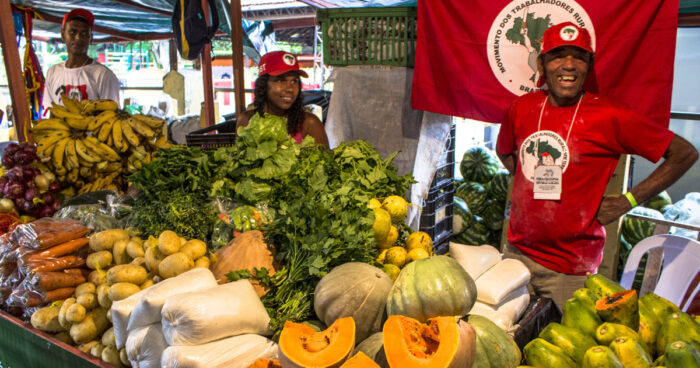
MST members sell their products at a farmers market.
Historically, anarchism has been, and still is, present in peasant struggles: China, Ukraine, Spain, Perú and other examples. Anarchism must be a part of struggles from below, and wherever we have space to contribute with our proposals and build popular power. The agrarian, land (access to land and land concentration), peasant, indigenous, black, and quilombola questions are central in Latin america, in spite of the demographic concentration in big cities. In large part we are agricultural export countries, where natural resources are tremendously exploited by capital, who have a very strong base of people of indigenous, black, and peasant origin, with an extreme concentration of land in the hands of capitalists, latifundiários [large landowners], and foreigners. There are many conflicts in the rural areas, with assassinations of community leaders and militants, land grabs and evictions. Not to mention the issue of food sovereignty, of the production of food for the people in opposition to the agribusiness model that produces commodities for export. So the issue of land is very important in Brazil and throughout the continent, and from there we see the importance of us being inserted in those struggles as well. Understanding that while we have our own goals, the rural and urban struggles should be connected.
We also learn a lot in these mass movements, contributing to our political training as militants, particularly in base-building work. Be it in courses, materials and spaces for political training in movements, or in the day-to-day of grassroots work.
Currently, in the context of COVID-19, rural movements have a great importance for producing healthy foods for the population, and for leading on issues of environment, energy, and food sovereignty. There are analyses that point out a “pandemic” of a lack of food for the population. Many favelas already have people who are experiencing hunger. In response, there are many campaigns of solidarity and of distributing food boxes to residents of favelas and packed lunches for people living in the street. Unions and people are making donations for the purchase of these foods from rural movements and urban agriculture movements in the city of Rio. That is, the acts of solidarity have multiplied and are organized by the population and by social movements.
BRRN: What has been your experience as an anarchist participating in/collaborating with these movements? How do you push within these movements for more anti-authoritarian/anarchistic practices?
FARJ: We believe that the experience, here in Rio de Janeiro, provides an opportunity for us to have an influence. One aspect of the practical political training too, through participating in mass movements like these, is contributing to the organization of collective processes. There is contact with the people, with concrete realities and problems, and the need to think of ways to solve problems through organizing and base-building. There are also formal political training processes, such as national and local courses, visits to experiences in other states, and state and national encounters. Specific political trainings on certain issues or just in daily life, in contact with other militants and comrades.
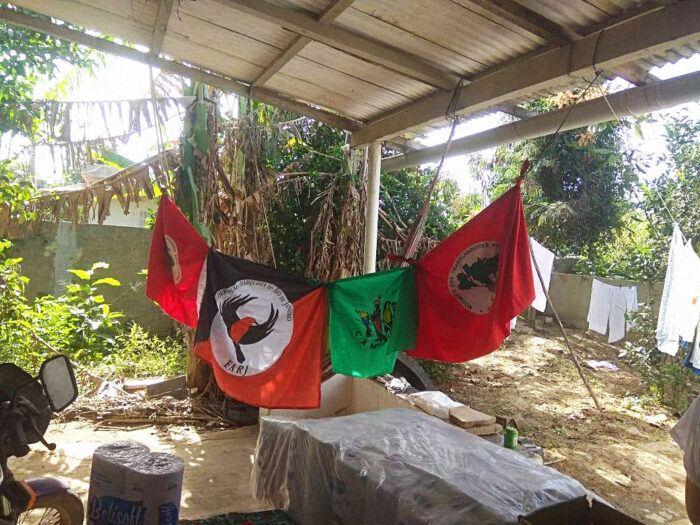
A FARJ flag tied together with the flag of MST.
For example, because of the tasks and trainings of the social movements, I was able to learn about communication, and agroecological management and cooperatives, in addition to the debates around agrarian and food issues. We also bring these accumulated skills and knowledge to the political organization, in the sense that they characterize and contribute to the accumulation of political training that we have for our entire militancy. In other words, it is a two-way street, a dialectical process, adapting to the formation and interest of our organization. So it is important that it is not just an individual accumulation, but that it helps in some way in the formation of the entire militancy of the specific [anarchist] organization.
Here in the state of Rio, I believe that most of the common challenges to social movements, both in the rural areas and in the city, are due to the difficulty of base-building, often the need for more militants, the difficulty in obtaining resources and structure–organizational difficulties. There are also difficulties in achieving a more consolidated articulation between the various social movements, which end up being more sporadic or a part of campaigns. In the face of a reality of advancing ultraliberalism and the systematic extinction of social rights and policies, it is a permanent challenge to build processes that are able to self-manage and mobilize the people in communities and base-building locations. But in general, we seek to help organize what is disorganized, acting as yeast in mass struggles.

Members of FARJ and MOB in a mass demonstration.
BRRN: In the interview that FARJ did with Zabalaza, the Association of Autonomous Producers of the Countryside and the City (APAC) was mentioned. I’m very curious to know more about that organization, what they do, and how that association builds urban and rural solidarity around questions for food sovereignty and land?
FARJ: APAC played an important role in producing agricultural implements for small producers. Its origin came from CADTS, the Center for Learning and Technical and Social Development, a group linked to Social Pastorals who worked with the education of urban workers, politically training electricians, seamstresses, machinists, printers and other professions. This work strengthened their performance in the union and community fields. In order to strengthen solidarity between rural and urban workers, CADTS initiated a project to develop agricultural implements with technology built together with “tillers of the land”, an expression used at the time. In their visits to rural workers to gather information and design the implements, the CADTS students decided to structure this work to meet this demand that they had already met for several groups of farmers all over Brazil. Thus, APAC was born on the 1st of May, bringing together not only “metallurgists”, but also farmers, homemakers, unemployed people, popular educators, etc. with the organicity, inspired by self-management, of an association composed of several autonomous work groups that articulate themselves collectively in a general assembly. Over more than 30 years since its foundation, APAC has welcomed many groups of workers. We will mention just a few to illustrate its diversity:
- Multimetal: The manufacture of metal parts and equipment, from which various tools for the field were made. After a few years it was replaced by OPMAC, which refers to the word “field” [“campo”], these metal design services continued and over they time began to develop projects for urban workers such as wagons adapted for waste pickers for recycling, the manufacture of recycled brooms, etc.
- Arte Fuxico: Gathering artisans who reused leftover fabrics from the clothing industry and made customized pieces such as bags, rugs and tools in general.
- Community Pré-Vestibular prep courses: Popular education initiative that sought space at APAC to assemble a preparatory course for admission to universities. The nucleus of the APAC course lasted a few years and was part of a network of community courses from different regions.
- Auto Mechanics: Auto repair shop that brought together a master mechanic and their assistants. The group provided internal and external services to APAC and had a very important role in teaching the trade of mechanics and attendance at the association’s assemblies.
- Printer: A print shop that brought together workers mostly from CADTS backgrounds who developed graphic design projects and editions of numerous publications for social movements and various external services.
Our arrival at APAC was parallel to the founding of FARJ, and we have some militants who’ve had and have closer relations with them, either through collaborating on projects or some being part of the management of APAC. We’ve come to do a screen printing workshop there, political meetings, community work groups, political training lectures and popular language courses. We will highlight one of the most structured initiatives of our militancy, which was to organize the Floreal Cooperative of Workers in Agroecology, where we had great interaction with the internal groups of APAC, bringing agendas discussed with our work with the Forum of Popular Cooperativism, the Articulation of Agroecology of Rio de Janeiro and the Technical Assistance and Extension sectors. It was a period that encouraged APAC to contribute to issues of agrarian conjuncture, agroecology, urban agriculture, school gardens, popular herbalism groups, social ecology, rural/urban solidarity and food sovereignty and agrarian reform. This factor strengthened the relationship of our militants with the social movements in the countryside, such as the MST, CPT, and MPA, as well as for the use of space as a warehouse or for the manufacture of agricultural implements. But our experience with popular cooperatives opened doors for us to contribute to the construction of cooperatives and associations in the movements.
BRRN: Are you involved with the Territorial Solidarity Committees, organized by the MPA as a response to the current social crisis? Can you share a bit about this project?
FARJ: In this context of COVID-19, rural movements, such as MPA and MST, the CPT and urban agriculture groups such as the Carioca Urban Agriculture Network, and the Agroecology Articulation, have developed solidarity actions in the countryside and in the city.
MPA is with the Territorial Solidarity Committees. With the distribution of agroecological foods, creating spaces for dialogue and political debates, strengthening the organizational processes between the social and territorial movements of the countryside and the city. The actions can happen in different ways depending on the local reality and demands. The movement has continued providing material support in the city with weekly deliveries of peasant food boxes, and the donation of meals for homeless people.
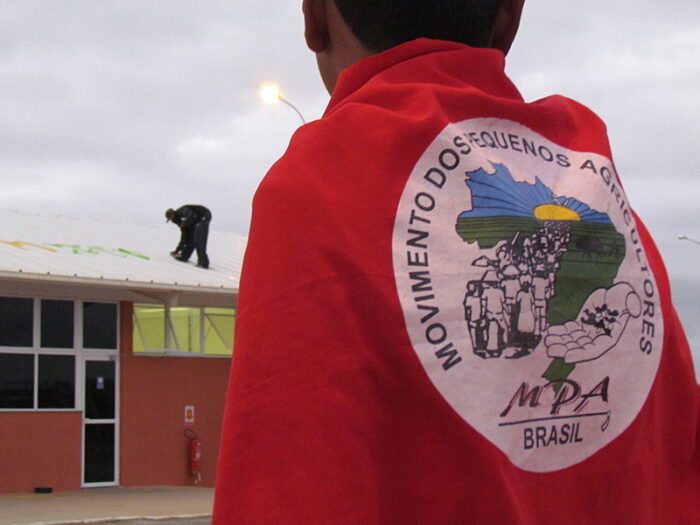
The logo of MPA.
The MST has Marmita Solidária, which receives donations from unions and supporters to buy food to prepare meals for the homeless. And the Nós por Nós (“Us for Us”) Campaign, which is part of the Periferia Viva (“Alive Periphery”) Campaign, and which MPA and other movements also participate in. The campaign raises funds to buy agroecological produce from settlements and small farmers to donate to favelas, and together do support work, such as legal aid for those who do not have identity documents, or other actions in addition to just donating food.
For CAB (Brazilian Anarchist Coordination) we are organizing the Vida Digna (“Dignified Life”) national campaign, against the increase in the cost of living. There are state and local committees, and we managed to arrange a food donation from the MST for two occupations of the Internationalist Front of the Homeless. CPT also articulated a possibility of resourcing landless settlements and quilombola communities, among others, in the northern region of the state of Rio, together with MPA.
But across the country, several similar actions are taking place with our CAB militants involved, seeking to articulate solidarity actions between the countryside and the city, between small farmers and indigenous communities. Actions that bring supporters of the city that want to help. We hope that all this helps to bring the movements of the countryside and the city closer, in a more organic way, between the bases of these movements as well. Actions that make movements think together forms of everyday solidarity, without needing projects, politicians or public policies.
This pandemic meant that movements and collectives had to create other forms of distribution, other forms of logistics to continue with production and distribution of their products. And all of this may be important in the future, if the movements manage to define the right strategic policies, as we will have less and less public policies for the countryside by the State. On the contrary, attacks on indigenous people, peasants and land grabbing are only increasing.
BRRN: The MST is probably the most well-known of Brazil’s social movements globally; the organization and its impressive accomplishments in terms of seizing and redistributing land to thousands of families, promoting agroecology and food sovereignty, and its contribution to global peasant movements, has been a source of inspiration for revolutionaries around the world, including many anarchists. From afar, it seems like there are many aspects of the organization’s practices and tactics that align with anarchist principles. At the same time, there are characteristics of the MST, such as their Marxism-Leninism, and relationship to the PT, which might present challenges for anarchists who wish to support/participate/collaborate with the MST. I’d love to know what FARJ’s assessment is of the MST, the positive aspects of the movement, any critiques you have, and how you navigate working with the MST.
FARJ: In Brazil, the land issue, the concentration of land, is central. Today, we are a country that is still a peripheral agrarian-exporter of commodities, despite being seen by other world powers as a contender, a world player, due to the size and natural assets it has, such as water, oil, mineral resources, etc. Which is why we have attacks and coups, which are present throughout the history of Latin American countries. So Brazil has always had strong agrarian and land conflicts, several historical revolts, not to mention the quilombos, the rural workers, the indigenous people.
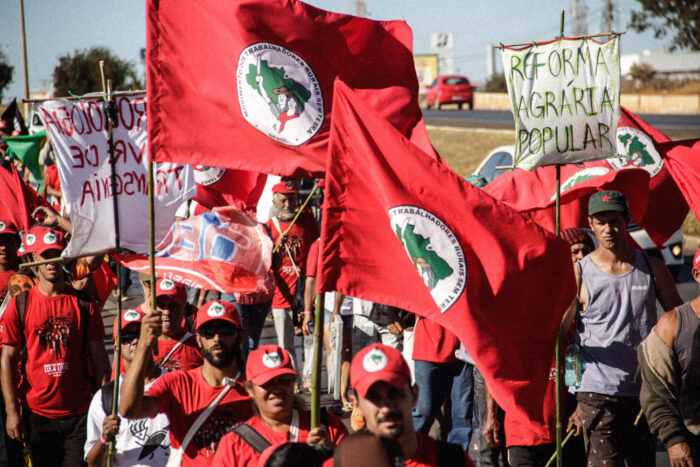
MST members on demonstration.
The MST, like other movements in the countryside, comes from this accumulation of struggles, conflicts and revolts. Before, one of the main movements was the Peasant Leagues (1954-1964). Over time, unions in the countryside that worked on these labor issues and for wage workers, employed on farms, etc., also appeared. With the coup and the business-military dictatorship (1964) the militants of the countryside also suffered a lot of repression, with more than a thousand dead and disappeared, and persecuting and repressing the Peasant Leagues.
Then there was the opening and conciliatory transition from dictatorship to democracy. Unlike countries like Argentina, the military in Brazil was not punished for the crimes of the dictatorship. At that time, several armed leftist resistance groups sought to resist the dictatorship. So the process that followed, in the 70-80s, also has the development and involvement of labor organizations, culminating in CUT (Unified Workers Central) (1983), progressive sectors of the church (CEBs (Eclesiastical Base Communities), Pastoral Land Commission and Liberation Theology), rural movements and the PT (Worker’s Party).
In the CUT there was the Rural Department, which brought together rural workers, with an agenda more related to labor rights. And the MST (and later MPA) also appeared to deal with agendas of rural demands from the countryside that were not only about labor conditions, but access to land, credit and public policies to produce and to continue reproducing their rural livelihoods. In other words, the CUT and the unions in the countryside did not cover all the peasant agendas.
The clergy and Liberation Theology had an important role together with the movements of the countryside, doing groundwork in the communities, mobilizing the people and contributing to the social movements that came to occupy the land.
This was the big political “broth” with a social base, which we address here in a very general way. And all this broth and struggles were being accumulated in the so-called Popular Democratic Project, with the PT as its political party expression. In other words, some of these major mass movements in Brazil have a very strong historical relationship with the PT. With the arrival of the PT in the government, the movements were also incorporating a political culture of being part of the state, of bureaucratizing themselves as well. This had as a consequence a great weakening of the movements, mainly today, with difficulties to mobilize the masses and to face the attacks of the fascist-oriented Bolsonaro government.
In addition, the main organizational reference of these movements is Marxism-Leninism and democratic centralism, even though sometimes the movements themselves recognize the need to seek other elements that better deal with the reality of the peasantry and the subjects of the countryside. So if the mechanisms of political participation are worked on, there are risks of falling into distant relations between the bases and the leadership of these movements. That is, the need for spaces that enable qualitative political participation from the grassroots, reflecting on the work in which they are inserted, forming themselves, leading the processes and contributing, from their reality, with the direction of the movement. It also avoids the risks of falling into pragmatism, or the so-called “putting out fires” daily, which accumulates little politically and socially, even if a lot is being done.
In our anarchist conception, we believe that the subject of social transformation is not given, but is formed in everyday work and struggle, and popular power is built with the subjects’ political participation, assuming responsibilities and protagonism in the struggles. Therefore, the organizational form needs to be aligned with a transformative ideological concept, so that it allows the advance of non-alienating organizational forms.
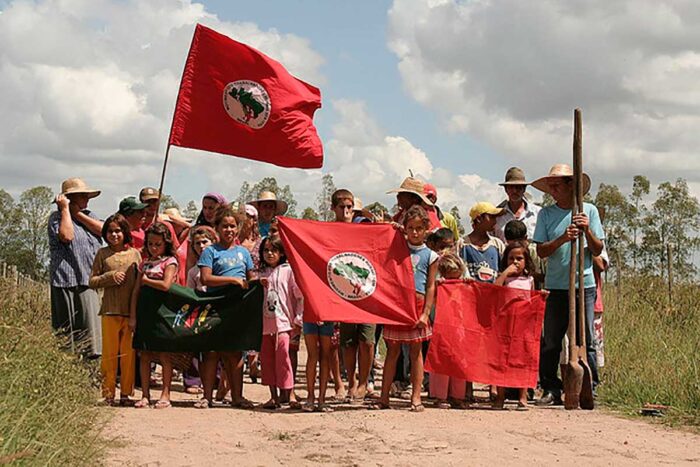
MST Farmers.
Therefore, we also seek to bring and project other historical experiences of struggle and organization of the working class, of the peasantry, of the originary communities. We have examples like the Mexican Revolution (1910), and the later Zapatista movement in Mexico. The struggle of the Makhnovist army in Ukraine, in the process of the Russian Revolution, processes with indigenous and peasant protagonism in the expropriation of land and social organization. The collectivization and organization of production and social processes in the Spanish Civil War, in the countryside and in the city, with the example of the CNT. Like Democratic Confederalism in Kurdistan, with the organization, self-defense, territorial and labor and production management in a collective and direct way. Current community experiences in Colombia with the concept of land as a common good, and demanding the permanence and reproduction of forms of community life in the territories. In short, there are various experiences, some known to the movements, in addition to other references that they also seek, and that we examine to study and identify elements that can contribute to our processes here.
Therefore, anarchism also needs to develop concrete tools for intervention in reality, for mobilizing and managing life in its different aspects, social, cultural, productive, economic. In other words, we also need to develop proposals to organize the countryside and to address these issues.
BRRN: Struggles for food sovereignty, agroecology, and agrarian reform raise some really critical questions for anarchists, particularly because many of the movements and academics that dominate the discourse don’t share our critiques of the state, electoralism, etc., and often see nation-state as the vehicle for achieving food sovereignty, agrarian reform, etc. I haven’t come across many contemporary anarchist perspectives on food sovereignty, agroecology, and agrarian reform, and I’m very curious to know about your reflections as an anarchist participating in these movements in Brazil, and how yourself and other FARJ militants in the Frente de Luta Camponesa think about food sovereignty and agrarian reform from an anarchist perspective—can we articulate a particular anarchist perspective on how to achieve and sustain food sovereignty and agrarian reform that is distinct from the perspectives of Marxist-Leninist, social democratic and liberal currents within social movements?
FARJ: We are starting to have this debate currently at CAB, in the Agrarian Working Group, among militants who work with rural movements, with indigenous, non-urban communities. With other movements like the MAM (Movement for Popular Sovereignty in Mining) and it has a little to do with the previous question. In other words, what are the concrete proposals of anarchism for reality? What is our anarchist program of struggle?
So we are beginning to discuss which concepts are important and central to us. Such as Food Sovereignty, agrarian reform or revolution, natural and energy resources. Bem viver (“living well”), as opposed to the logic of development, among others.
For us, these issues need to be related to popular demands, to popular reality. For us, agroecology must be a tool and principle to strengthen the struggle and organization of rural peoples and communities. In other words, we will also seek to apply these concepts and questions as references, within our anarchist conception, based on popular reality, to strengthen our work of base-building and building popular power.
Some of these concepts are also worked on by the rural social movements such as food sovereignty, agroecology, feminism. But it is clear that we need to develop our conceptions about them as well. But we can say, in general, that the left often has a reading of reality that is very urban, valuing questions around trade unions and urban issues more, reproducing this centrality in the urban. And anarchism is not free from reproducing some of that, too.
BRRN: Needless to say, the historical processes of colonialism and capitalist development around the world have left a mess of contradictions for different oppressed classes and communities to navigate when it comes to the questions of land. Here in the US, because social movements are so weak, the discourse and struggles around land and land reform don’t seem to be as advanced when compared to the Brazilian context. One critical question here in the US & Canada—two european settler colonial projects situated on stolen indigenous territories—is how different oppressed populations in struggle around questions of land—indigenous peoples, people of African descent, small farmers, migrant farm workers, etc. can be in solidarity with one another as opposed to being pitted against one another by the contradictions created by the systems of settler colonialism and capitalism. I’m very curious to know where the discourse around these complicated questions are among the social movements you work with, and what your perspectives are on them, as anarchists? In Rio de Janeiro, are there promising signs of solidarity between indigenous people, quilombola communities, peasant farmers and farm workers? Can you recommend some good sources for folks who would like to learn more about these questions and struggles?
FARJ: Similar territorial issues also occur here, I believe also to be the consequences of the historical processes of colonialism, structural slavery and patriarchy and the other oppressions enhanced by capitalism.
Brazil, being a country of continental dimensions, poses several challenges. For example, there is a reality, a relationship with the land and culture of settlers in the south of the country, and there is another one of the indigenous communities and other subjects in the north of the country. This already poses several questions for the fight and the movements as well. For example, the issue of working with the idea of the peasant subject, in the face of these diversities. It also involves knowing and knowing how to understand other organizational forms, which may be different from the organizational forms that the traditional left reproduces.
On the other hand, Brazil has this great potential for struggle and for people and subjects in the countryside. Almost 40% of the land in the country is land reform settlements, indigenous lands (recognized or not), quilombos, peasant communities. The powerful know of this potential and are afraid. That is why they invest in repression and the dismantling of social rights, land grabbing, paramilitary violence, etc.
It is a social diversity that is a reality in Latin America. The strength of the indigenous people in Peru, Ecuador, Bolivia. The Mapuche in Argentina and Chile. Colombia is also a very rich and interesting country, with Afro-Colombian communities, various indigenous ethnicities, peasants. There is the CNA (National Agrarian Coordinator), a significant peasant movement in the country, there is a very interesting debate on “agri-food territory”, for example.

In Rio the MPA has been making contacts and working with some quilombola communities, and now indigenous communities. In the capital there is the struggle of Aldeia Maracanã, which mobilized enough supporters against the speculation and gentrification that the Olympics mega-event blew open. There are many possibilities for dialogue between quilombos, indigenous villages, favelas, rural and city movements and we can go further. Actions such as community gardens, urban agriculture, are also interesting possibilities for the food sovereignty of favela dwellers, and possibilities for dialogue with rural movements. The organization of consumer collectives in cities, organizing themselves for access to and distribution of healthy food in the countryside. Collective investment groups of supporters, enabling rural production. Supportive relationships between different sectors of the working class, deliverers, education workers, students. The possibilities of organizing from below are many.
A few websites for reference and more information:
Virtual Library of the Landless Rural Workers Movement (MST) – www.reformaagrariaemdados.org.br/biblioteca
Movement of Small Farmers (MPA) – www.mpabrasil.org.br
Movement for Popular Sovereignty in Mining (MAM) – http://mamnacional.org.br/
National Agrarian Coordinator (Colombia) – www.cna-colombia.org
Pastoral Land Commission (CPT) – cptnacional.org.br
Rio Grande do Sul Quilombola Front – www.facebook.com/FrenteQuilombolaRs
Coordination of Indigenous Organizations of the Brazilian Amazon – www.facebook.com/coiabamazoniaoficial
Articulation of the Indigenous Peoples of Brazil (APIB) – www.facebook.com/apiboficial
Articulation of the Indigenous Peoples of the Southern Region – www.facebook.com/ARPINSULBRASIL
Mídia India – www.facebook.com/VozDosPovos
Indigenous Council of Roraima (CIR) – www.facebook.com/conselhoindigena.cir
Articulation of Indigenous Peoples and Organizations of the Northeast, Minas Gerais and Espirito Santo (APOINME) – www.facebook.com/apoinme.brasil
People’s Web (Teia dos Povos) – www.facebook.com/TeiadosPovosoficial
BRRN: Anything else you’d like to share?
FARJ: We would like to thank the space and the opportunity to share the experiences and work here. There are other comrades organized at CAB who can also contribute with their experiences from their states and our work also has contributions from them. We hope to have contributed to Black Rose, and to help more people know a little more about the struggles in Brazil and on our continent. We also hope to have more opportunities for exchanges like this one with our comrades from BR, who also inspire us. Spaces like this are essential. Arriba lxs que luchan!!!
1. There is no direct translation of the term formação, as it is used by the social movements, in English. In this interview I’ve translated it as “political training”, though it can be more accurately understood as the collective processes within social movements that include “consciousness-raising work, political education, and leadership development.” For more discussion of the concept and practice of formação, see “Leadership development and Formação in Brazil’s Landless Workers Movement (MST)” by Dawn Plummer
This interview was conducted by a member of Black Rose Anarchist Federation’s New York City Local.

